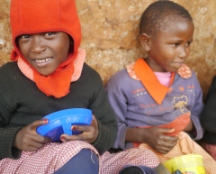On October 30, practitioners, academics and those affected by HIV/AIDS alongside over fifty members of the UK Consortium on AIDS and International Development, met to discuss current research and programming on Psychosocial Support Services (PSS) in relation to HIV.
Increasing social protection measures - an essential component of PSS
In the opening session of the day’s event, Dr. Lucie Cluver of Oxford University argued that increased social protection measures, including the provision of free
school meals, are of utmost importance for vulnerable children - those infected or affected by HIV.
Dr. Cluver's presentation looked into two studies;the first anorphan resilience study andthe second, anational young carer’s study, which have been carried out over the past seven years in South Africa, surveying approximately 8000 children.
The event was co-organised by the Consortium’s Care and Support Working Group and the Children Affected by AIDS (CABA) Working Group - which is supported by the Partnership for Child Development.

The surveys found that children orphaned by AIDS suffer increased levels of depression, post-traumatic stress, peer problems and delinquency. They also have higher anxiety scores. Children who are carers of parents with AIDS also suffer similar levels of anxiety and depression.
Child carers often miss school (to look after their parent), and are more likely to have poor concentration in class andto go to school hungry. Child abuse is also common when parents suffer with AIDS with an increase in physical, emotional and domestic violence often found.
Dr. Cluver also emphasised how child focused grants, could also result in decreased vulnerability and lessen the prevalence of transactional sex in girls, and specifically, with the support of free schooling boys could obtain better school results.
Event topics
Throughout the day contemporary research and programming on psychosocial support services (PSS) in relation to HIV and AIDS was examined with discussion from the UK Consortium members focused around good practice.
The event demonstrated that PSSare an essential component of any HIV programme. Attendees heard people living with HIV share their experiences, practical ways to provide evidenced-based interventions presented by academics and practitioners,and thegeneralmeaning ofwhat PSS signified to participants ingrained in discussionthroughout the day.
The need for PSS to be person-centred was noted. PSS should take a holistic approach and ensure active participation of patients in their own care. PSS should result in a person living with HIV feeling happy, reassured, to have an understanding of HIV terminology and above all be hopeful for the future.
Topics covered throughout the day included: facilitating resilience of HIV-affected children and youth through social environments; psychological support and child protection training; and delivering high quality care in sub-Saharan Africa.
Further reading
And access Schools& HealthDocument Downloads on HIV

